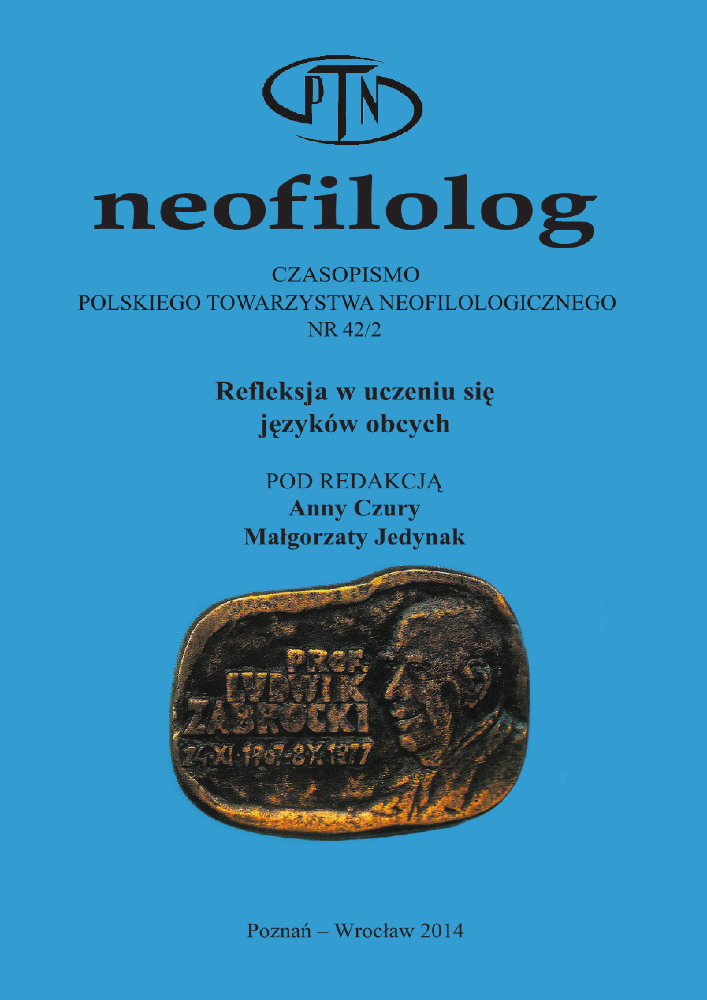Abstract
Building learner autonomy requires effective communication and cooperation between teachers and students with regard to teaching/learning goals and methods. In addition, critical reflection on the progress being made is needed. This paper aims to represent the voices on one side of this dialogue, by investigating the perceptions that Business English students at the University of Economics in Katowice have of the roles which ESP teachers should take. This study into learner autonomy sees the co-responsibility of learners for the outcomes of the teaching/learning process as a significant determinant of the development of autonomy. Besides providing an interesting insight into the needs and expectations of Business English students, the results may contribute to the discussion on the benefits of and problems related to the development of autonomy among young adults in tertiary education.
References
Bhatia, V. K. 2004. Worlds of Written Discourse. London/New York: Continuum.
Benson, P. 1997. „The philosophy and politics of learner autonomy” (w:) Autonomy and Independence in Language Learning. (red. P. Benson, P. Voller). London: Longman: 18-27.
Benson, P. 2001. Teaching and Researching Autonomy in Language Learning. Harlow: Pearson Education.
Billington, D. D. 2000. Seven Characteristics of Highly Effective Adult Learning Programs. New Horizons for Learning. Seattle: New Horizons. www.newhorizons.org.
Chan, V. 2001. „Readiness for learner autonomy: what do our learners tell us?” Teaching in Higher Education 6(4): 505-519.
Dickinson, L. 1995. „Autonomy and motivation: A literature review”. System 23(2): 165-174.
Dudley-Evans, T., St John, M. J. 1998. Developments in ESP. A Multi-Disciplinary Approach. Cambridge: Cambridge University Press.
Holec, H. 1981. Autonomy and Foreign Language Learning. Oxford: Pergamon.
Hutchinson, T., Waters, A. 1987. English for Specific Purposes. A Learning-Centred Approach. Cambridge: Cambridge University Press.
Kierczak A. W., Sitko, A. 2004. „Autonomia ucznia a nauczanie języka specjalistycznego, czyli czy wprowadzać autonomię na lektoratach?” (w:) Autonomia w nauce języka obcego. (red. M. Pawlak). Poznań-Kalisz: Wydawnictwo UAM: 149-159.
Komorowska, H. 2002. Metodyka nauczania języków obcych. Warszawa: Fraszka Edukacyjna.
Little, D. 1991. Learner Autonomy 1: Definitions, Issues and Problems. Dublin: Authentik.
Little, D. 1995. „Learning as dialogue: The dependence of learner autonomy on teacher autonomy”. System 23(5): 175-182.
Littlejohn, A. 1985. „Learner choice in language study”. ELT Journal 39(4): 253-261.
Li, X. 2012. „The application of learner autonomy theory and model into ESP technology-assisted curriculum construction”. International Journal of English Linguistics 2(5): 94-100.
Michońska-Stadnik, A. 2004. „Autonomia ucznia 400 lat po Galileuszu, czyli szansa dla odpowiedzialnych” (w:) Autonomia w nauce języka obcego. (red. M. Pawlak). Poznań-Kalisz: Wydawnictwo UAM: 11-18.
Nunan, D. 1996. „Towards autonomous learning: Some theoretical, empirical and practical issues” (w:) Taking Control: Autonomy in Language Learning. (red. R. Pemberton, E.S.L. Li, W.W.F. Or, H. Pierson). Hong Kong: Hong Kong University Press: 13-26.
Pawlak, M. 2004. „Autonomia studenta anglistyki – deklaracje a rzeczywistość” (w:) Autonomia w nauce języka obcego. (red. M. Pawlak). Poznań-Kalisz: Wydawnictwo UAM: 173-191.
Sobkowiak, P. 2003. „Studium przypadku w dydaktyce języków obcych dla celów specjalnych”. Języki Obce w Szkole 4: 7-12.
Sobkowiak, P. 2008. Issues in ESP: Designing a Model for Teaching English for Business Purposes. Poznań: Wydawnictwo Naukowe UAM.
Surdyk, A. 2005. „Postawy uczących się w dydaktyce języków obcych w ujęciu autonomizującym” (w:) Nauka języków obcych w dobie integracji europejskiej. (red. K. Karpińska-Szaj). Łask: Oficyna Wydawnicza LEKSEM: 299-311.
Turula, A. 2004. „Czy warto siać? – autonomia na kursach językowych dla dorosłych” (w:) Autonomia w nauce języka obcego. (red. M. Pawlak). Poznań-Kalisz: Wydawnictwo UAM: 285-289.
Voller, P. 1997. „Does the teacher have a role in autonomous language learning?” (w:) Autonomy and Independence in Language Learning. (red. P. Benson, P. Voller). London: Longman: 98-113.
Wilczyńska, W. 1999. Uczyć się czy być nauczanym. O autonomii w przyswajaniu języka obcego. Warszawa/Poznań: Wydawnictwo Naukowe PWN.
Wilczyńska, W. 2002. „Podmiotowość i autonomia jako wyznaczniki osobistej kompetencji komunikacyjnej” (w:) Autonomizacja w dydaktyce języków obcych. Doskonalenie się w komunikacji ustnej. (red. W. Wilczyńska). Poznań: Wydawnictwo Naukowe UAM: 51-67.
License
Copyright (c) 2019 Neofilolog

This work is licensed under a Creative Commons Attribution-NoDerivatives 4.0 International License.
Authors
Authors of texts accepted for publication in Neofilolog are required to complete, sign and return to the Editorial team’s office the Agreement for granting a royalty-free license to works with a commitment to grant a CC sub-license.
Under the agreement, the authors of the texts published in Neofilolog grant Adam Mickiewicz University in Poznań a non-exclusive, royalty-free license and authorize the use of Attribution-NoDerivatives 4.0 International (CC BY-ND 4.0) Creative Commons sub-license.
The authors retain the right to the free disposal of the work.
Users
Interested Internet users are entitled to use works that have been published in Neofilolog since 2017, under the following conditions:
▪ attribution – obligation to provide, together with the distributed work, information about the authorship, title, source (link to the original work, DOI) and the license itself.
▪ no derivatives – the work must be preserved in its original form. Without the author's consent, it is not possible to distribute the modified work in the form of translations, publications, etc.
Copyrights are reserved for all texts published since 2017.
Miscellaneous
Adam Mickiewicz University in Poznań retains the property right as a whole (layout, graphic form, title, cover design, logo etc.).
